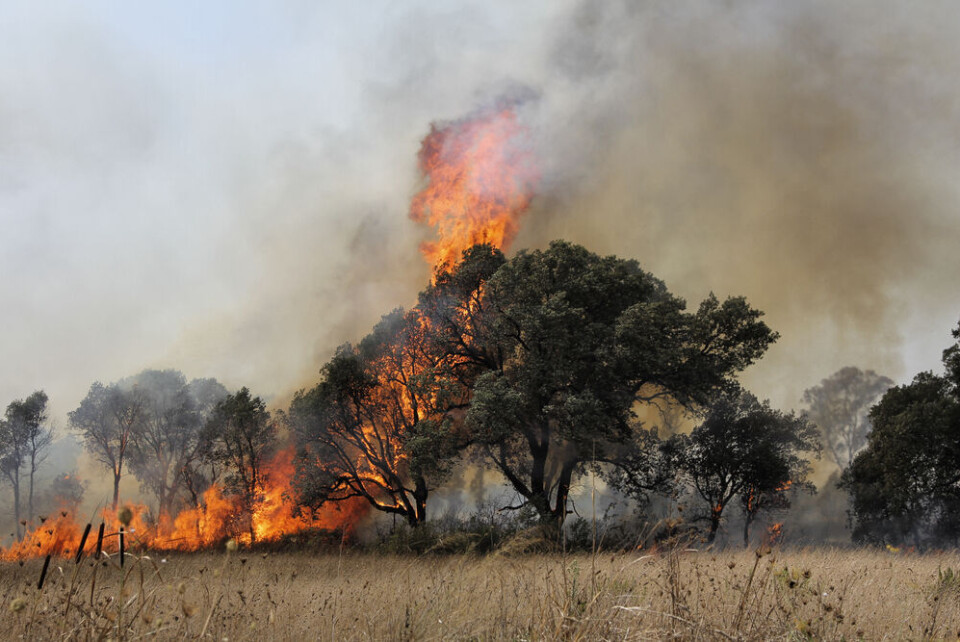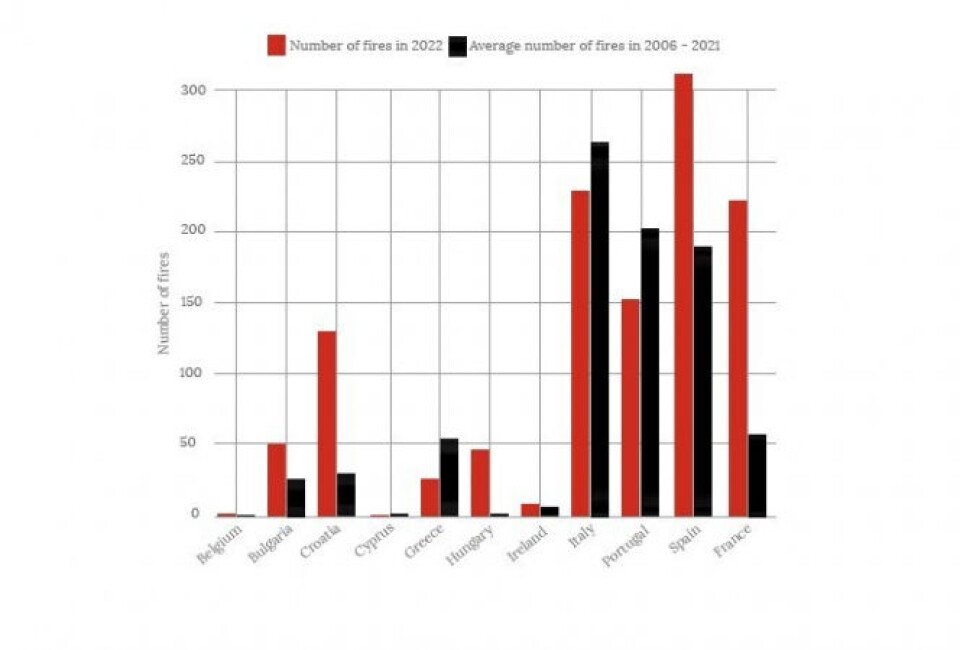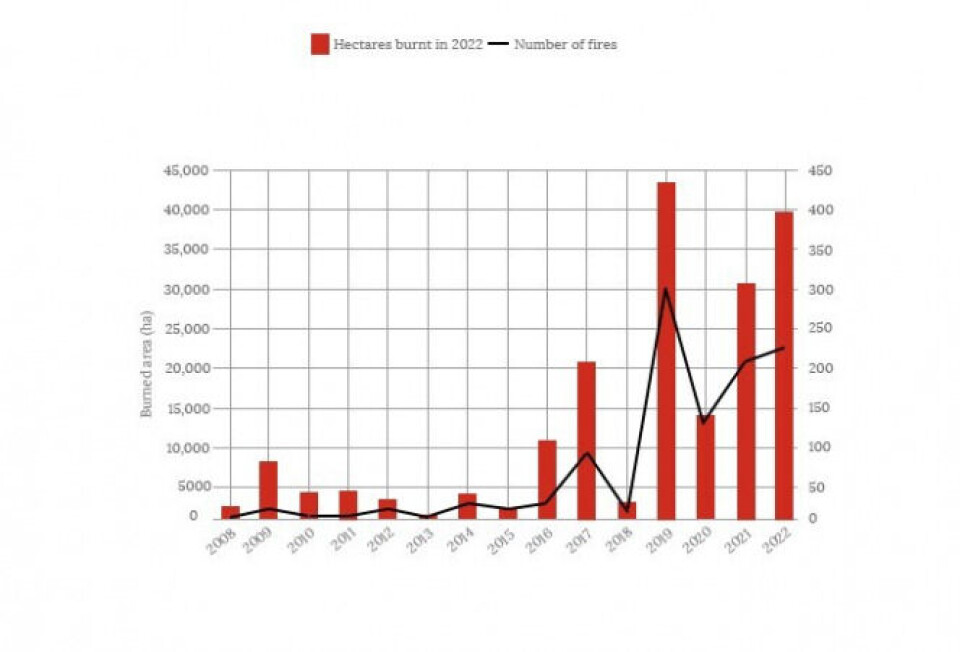-
More than 5,000 French communes use AI to identify poor rubbish sorting
Badly-sorted rubbish can cost millions so communes are turning to high-tech solutions
-
Tax on well-off retirees under consideration for 2026 budget
‘Nothing is off the table’ when it comes to finding €40 billion in savings says Labour Minister
-
Nice airport records passenger boom as tourists flock to city
Airport figures exceeded the pre-Covid record last year, with US visitors significant contributors
GRAPHS: See how recent French wildfires compare to previous years
This comes as firefighters manage to ‘contain’ the blazes in Gironde, with evacuated people beginning to return home

The two wildfires which began in Gironde on July 12 are now “contained” but not completely under control, having burnt nearly 21,000 hectares of land and caused the evacuation of 36,750 people from campsites and homes around La Teste-de-Buch and Landiras.
At the same time as these forest fires raged in southwestern France, there were other fires of varying degrees of severity in European countries including Portugal, Spain, Italy, Turkey, Slovenia and the UK.
We looked at how the number of wildfires occurring so far in 2022 compares to the average yearly number for 2006-21 in a selection of European countries.
It is worth noting that the 2022 number only takes us up to mid-July; the forest fire situation often gets worse in August, so the eventual total will almost certainly be higher for all of the countries in question.

This is based on data provided by the European Forest Fire Information System.
Looking at France in particular, the following graph reflects how many hectares of land have been burnt in wildfires occurring around the country each year since 2008.

Until 2016, the area burnt by fires was normally under 5,000 hectares, but since then it has climbed rapidly, especially in 2019, when around 43,000 hectares went up in smoke.
However, this year is already fast approaching that record, as nearly 40,000 hectares have already been destroyed.
‘The fire is contained but not fully under control’
Gironde’s prefect, Fabienne Buccio, has said in her latest update that the two fires burning in her department are “contained, but not fully under control”, and that work to extinguish them completely will “take several weeks”, and even after then the ground will need to be monitored.
She added that last night (July 21) “went well” in terms of the fight against the two blazes, which did not spread, and that firefighters flying overhead in a helicopter will now decide whether to declare the fires “under control”.
Fire crews are still tackling a few resurgences in Landiras and La Teste-de-Buch, and although a total of 6,000 people have been able to return home, over 30,000 are still displaced.
“Even if the vast majority of them will find their houses in the same state [as when they left them], the environment surrounding them will have changed; it will still be traumatic to see the beautiful forest gone,” Ms Buccio said.
Evacuated people will be allowed to return home “area by area”, in a “calm” manner. “We are hearing their impatience, we understand, but safety is our priority,” Ms Buccio added.
Firefighters who travelled across France to assist in the effort to control the fires will now begin “progressively” to return to their departments, although last night there were still 1,800 at the scene.
Further north in Brittany, the fire in the Monts d’Arrée hills (Finistère) is now completely under control, having burnt 1,725 hectares of land over three days. This makes it one of the worst fires which the region has ever seen.
Deer found dead on Biscarrosse beach, thought to be fleeing flames
The image of a deer which was found dead on a beach in Biscarrosse (Landes), just a few kilometres south of the La Teste-de-Buch fire, is being viewed as symbolic of a local ecosystem decimated by the Gironde wildfires.
The photograph was taken by Sébastien Dupuy on Tuesday (July 19), and went viral when it was posted on social media.
Mr Dupuy told Franceinfo that he was “surprised” to see a shape at the water’s edge when he took his morning walk on the beach, as it is normally “very clean in the morning during the summer season.”
When he realised that the shape was a deer, Mr Dupuy reported it to the mairie, which took it away.
The deer did not have any burns on its body, which led Mr Dupuy to believe that: “There is a chance that it tried to flee the forest fires by heading for the Atlantic coast.
“I think that the animal found itself trapped on the beach, between the flames and the smoke, and did not have any other choice but to jump [into the water],” he said, suggesting that the sea could have then carried the deer towards Biscarrosse.
Philippe Rocq, president of the Secours animalier Sud Bassin animal rescue organisation, considered this to be a likely explanation for the discovery of the deer on the beach.
“An animal is prepared to do anything to avoid the flames. Its instinct is to flee fire, which is, in its mind, the most dangerous element [in nature].
“These are forest creatures; they don’t have any idea about the risks the ocean represents.
“With fires, fauna is in danger: especially slower animals like squirrels, small lizards and rabbits.”
The Ligue pour la protection des oiseaux, which has a centre for animals in distress in Audenge (Gironde), has warned, however, that internet users should not “catastrophise” the image by sharing it with “very little to no information”.
Related articles
Wildfires to become daily reality in France by 2023, warns fire chief
Brittany wildfire started by local burning garden waste against rules
People in Ile-de-France can smell smoke of Gironde fires 500kms away
























